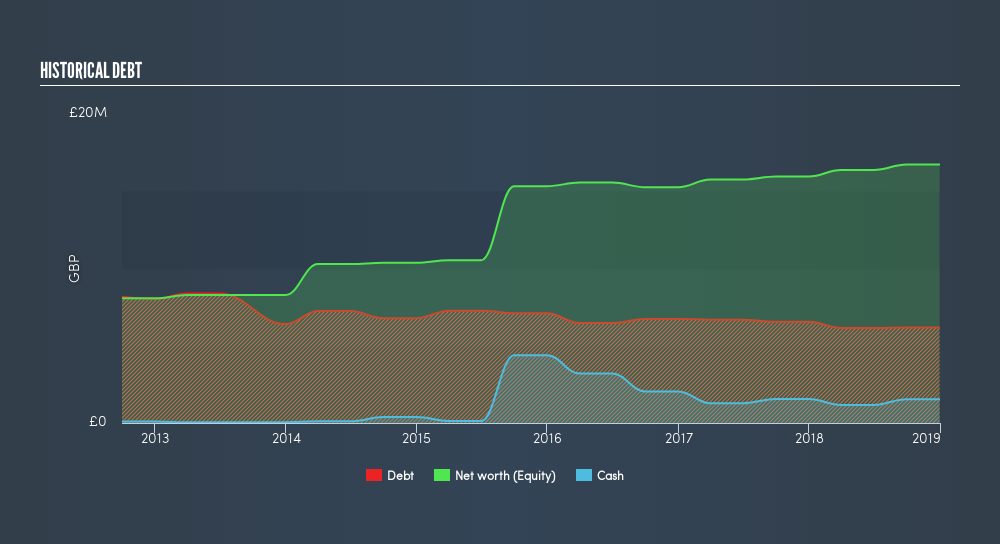
Want to participate in a short research study? Help shape the future of investing tools and you could win a $250 gift card!
Some say volatility, rather than debt, is the best way to think about risk as an investor, but Warren Buffett famously said that 'Volatility is far from synonymous with risk.' It's only natural to consider a company's balance sheet when you examine how risky it is, since debt is often involved when a business collapses. We note that Norish Plc (LON:NSH) does have debt on its balance sheet. But the real question is whether this debt is making the company risky.
When Is Debt Dangerous?
Debt assists a business until the business has trouble paying it off, either with new capital or with free cash flow. Ultimately, if the company can't fulfill its legal obligations to repay debt, shareholders could walk away with nothing. While that is not too common, we often do see indebted companies permanently diluting shareholders because lenders force them to raise capital at a distressed price. By replacing dilution, though, debt can be an extremely good tool for businesses that need capital to invest in growth at high rates of return. When we think about a company's use of debt, we first look at cash and debt together.
See our latest analysis for Norish
How Much Debt Does Norish Carry?
As you can see below, Norish had UK£6.43m of debt at December 2018, down from UK£6.95m a year prior. However, because it has a cash reserve of UK£1.54m, its net debt is less, at about UK£4.89m.

A Look At Norish's Liabilities
The latest balance sheet data shows that Norish had liabilities of UK£10.5m due within a year, and liabilities of UK£2.79m falling due after that. Offsetting this, it had UK£1.54m in cash and UK£6.25m in receivables that were due within 12 months. So its liabilities outweigh the sum of its cash and (near-term) receivables by UK£5.49m.
This deficit isn't so bad because Norish is worth UK£20.6m, and thus could probably raise enough capital to shore up its balance sheet, if the need arose. But it's clear that we should definitely closely examine whether it can manage its debt without dilution. Since Norish does have net debt, we think it is worthwhile for shareholders to keep an eye on the balance sheet, over time.
We measure a company's debt load relative to its earnings power by looking at its net debt divided by its earnings before interest, tax, depreciation, and amortization (EBITDA) and by calculating how easily its earnings before interest and tax (EBIT) cover its interest expense (interest cover). The advantage of this approach is that we take into account both the absolute quantum of debt (with net debt to EBITDA) and the actual interest expenses associated with that debt (with its interest cover ratio).
Norish's net debt to EBITDA ratio of about 1.67 suggests only moderate use of debt. And its commanding EBIT of 11.5 times its interest expense, implies the debt load is as light as a peacock feather. We saw Norish grow its EBIT by 8.5% in the last twelve months. Whilst that hardly knocks our socks off it is a positive when it comes to debt. When analysing debt levels, the balance sheet is the obvious place to start. But it is future earnings, more than anything, that will determine Norish's ability to maintain a healthy balance sheet going forward. So if you want to see what the professionals think, you might find this free report on analyst profit forecasts to be interesting.
But our final consideration is also important, because a company cannot pay debt with paper profits; it needs cold hard cash. So the logical step is to look at the proportion of that EBIT that is matched by actual free cash flow. Considering the last three years, Norish actually recorded a cash outflow, overall. Debt is far more risky for companies with unreliable free cash flow, so shareholders should be hoping that the past expenditure will produce free cash flow in the future.
Our View
On our analysis Norish's interest cover should signal that it won't have too much trouble with its debt. However, our other observations weren't so heartening. In particular, conversion of EBIT to free cash flow gives us cold feet. Looking at all this data makes us feel a little cautious about Norish's debt levels. While we appreciate debt can enhance returns on equity, we'd suggest that shareholders keep close watch on its debt levels, lest they increase. Of course, we wouldn't say no to the extra confidence that we'd gain if we knew that Norish insiders have been buying shares: if you're on the same wavelength, you can find out if insiders are buying by clicking this link.
At the end of the day, it's often better to focus on companies that are free from net debt. You can access our special list of such companies (all with a track record of profit growth). It's free.
We aim to bring you long-term focused research analysis driven by fundamental data. Note that our analysis may not factor in the latest price-sensitive company announcements or qualitative material.
If you spot an error that warrants correction, please contact the editor at editorial-team@simplywallst.com. This article by Simply Wall St is general in nature. It does not constitute a recommendation to buy or sell any stock, and does not take account of your objectives, or your financial situation. Simply Wall St has no position in the stocks mentioned. Thank you for reading.
About AIM:RFG
Roebuck Food Group
Focuses on the novel products, and supplies plant-based ingredients and products in the United Kingdom, Ireland, and internationally.
Slight with worrying balance sheet.
Market Insights
Community Narratives





